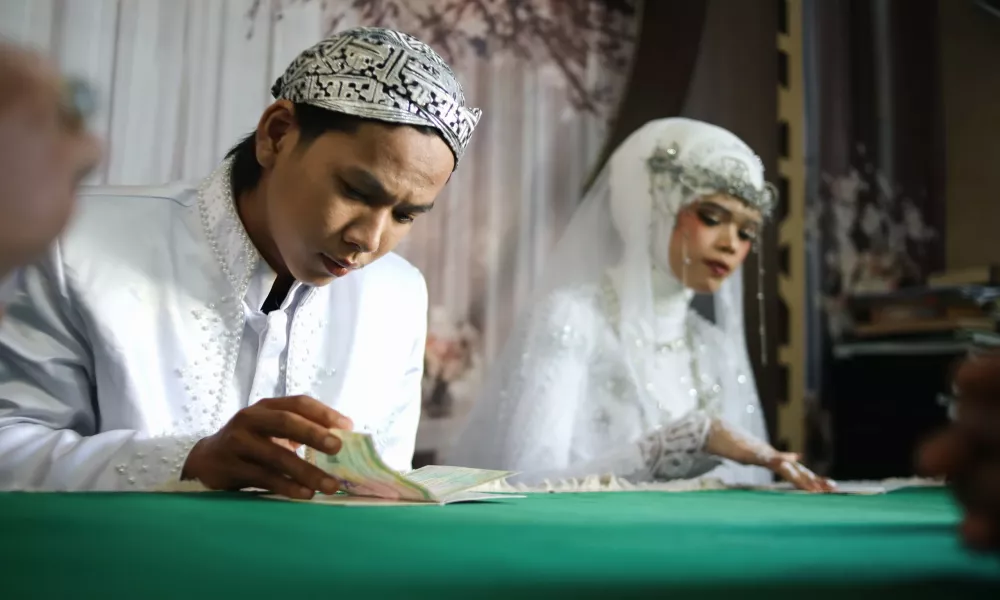
Court Marriages For Muslim In Ajman
Table of Contents ▼
Court marriages in Ajman offer a simple and legal way for Muslim couples to marry. The process is recognized under UAE law and provides a straightforward solution. It is especially suitable for those seeking an official union without a traditional ceremony.
Ajman’s court system ensures that all legal requirements are met. Couples must provide valid documents, including identification and proof of single status. This option is widely preferred for its efficiency and legal validity. Other than this, the couple may explore the option of Abu Dhabi Court marriage.
In this blog, we will explain how Muslims can tie knots through court marriages in the UAE, what the legal repercussions are, and the provision of Sharia law in court marriages in Ajman for Muslims.
Table of Contents
Is there a difference between court marriages for Muslims and Civil Marriages?
Yes, there’s a difference! Court marriages for Muslims in Ajman are based on Sharia laws, meaning they follow Islamic requirements. This includes having a wali (guardian) for the bride, two Muslim male witnesses, and adherence to religious guidelines. It’s ideal for Muslim couples who want their marriage recognized under Islamic law.
Civil marriages, however, are non-religious and cater to couples of any faith or interfaith background. They don’t involve religious rituals, making them suitable for those seeking a secular union.

What are the Legal Requirements for Court Marriage For Muslims in Ajman?
In Ajman, Muslim court marriages are conducted in accordance with Sharia law and require the following legal prerequisites:
- Registration: The marriage contract must be officially registered in a Sharia court within the UAE.
- Legal Age: Both parties should be at least 18 Hijri years old. If either party is younger, judicial approval is necessary.
- Age Disparity: If one spouse’s age is double or more than that of the other, a judge’s consent is required.
- Premarital Screening: A premarital medical examination certificate is mandatory to ensure the health compatibility of the couple.
- Presence of Parties: Both the bride and groom must be present during the marriage proceedings.
- Guardian’s Consent: The bride’s father or his proxy must attend to provide consent, accompanied by two male Muslim witnesses.
- Proof of Status: Divorced or widowed individuals need to present official proof of their current marital status.
- Non-Muslim Father’s Consent: If the bride is Muslim and her father is non-Muslim, she must obtain a ‘No Objection’ letter from her respective embassy or consulate.
These stipulations are designed to ensure that marriages are conducted in compliance with Islamic principles and UAE legal standards.

What is the provision of Sharia Law for Court Marriages for Muslims in Ajman?
Under Sharia law, court marriages for Muslims in Ajman must adhere to Islamic principles, ensuring the union is valid and lawful in accordance with religious guidelines. The provisions include:
- Consent: Both parties must willingly agree to the marriage without coercion.
- Guardian (Wali): The bride must have her wali (male guardian, typically her father) present to consent on her behalf.
- Witnesses: Two male Muslim witnesses are required to validate the marriage contract.
- Mahr (Dowry): The groom must provide a mahr (mandatory gift) to the bride as specified in the contract.
- Documentation: The marriage must be officially registered in a Sharia court for it to be legally recognized.
- Premarital Medical Test: A medical fitness certificate is required to ensure the couple is compatible health-wise.
These provisions aim to uphold Islamic traditions while ensuring legal and social protection for both parties.
The Process of Muslim Court Marriage in Ajman
1. Preparing Documents
- Gather identification documents (Emirates ID, passports).
- Obtain a premarital medical certificate.
- Prepare proof of marital status (single, divorced, or widowed).
- If applicable, get a ‘No Objection’ letter for brides with non-Muslim guardians.
2. Filing the Marriage Application
- Submit the required documents to the Sharia Court.
- Fill out the official marriage application form.
- Pay the necessary court fees to process the application.
3. Court Proceedings
- Attend the court with both parties, the bride’s wali, and two male Muslim witnesses.
- The court verifies the documents and ensures all requirements are met.
- The marriage contract is signed, and the mahr (dowry) is agreed upon.
- Once approved, the court issues a certified marriage certificate.
This process ensures the marriage is legally and religiously valid.
What is the cost of court marriages for Muslims in Ajman?
Court wedding costs in Ajman typically start at around $960 (3500 AED). Prices for court marriage packages vary based on the services offered. Here are some options:
- Express Court Marriage: Starting from $960 / 3500 AED
- Basic Court Marriage Package: Starting from $1930 / 7100 AED
- Application Support Package: Starting from $1160 / 4250 AED
Additional fees may apply depending on specific requirements and documentation. For accurate details, consult local authorities or a wedding service provider in Ajman.

What is the difference between civil marriages and Islamic marriages?
The key differences between civil marriages and Islamic marriages lie in their principles, requirements, and legal frameworks:
Civil Marriages
- Legal Basis: Governed by secular laws, not tied to any religion.
- Participants: Open to individuals of any faith or no faith.
- Requirements: Typically include age proof, marital status, and a legal declaration of consent.
- Ceremony: Conducted by a legal officer or registrar with no religious rituals.
- Purpose: Secures a legal union recognized by civil authorities.
Islamic Marriages
- Legal Basis: Based on Sharia law, adhering to Islamic principles.
- Participants: Both parties must be Muslim, or a Muslim man may marry a Christian or Jewish woman.
- Requirements: Includes a wali (guardian) for the bride, a mahr (dowry), and two male Muslim witnesses.
- Ceremony: Involves religious rituals like the signing of a nikah (marriage) contract.
- Purpose: Secures a legal and religious union recognized by Islamic and civil authorities (if registered).
How much is mahr in UAE?
The mahr in the UAE has no fixed amount and is mutually agreed upon by the bride and groom, typically based on their financial circumstances.
Can Muslims do civil weddings in Abu Dhabi?
Yes, Muslims can now do civil weddings in Abu Dhabi. However, the only exception is UAE Muslims as they are not allowed to do civil marriages in Abu Dhabi.

